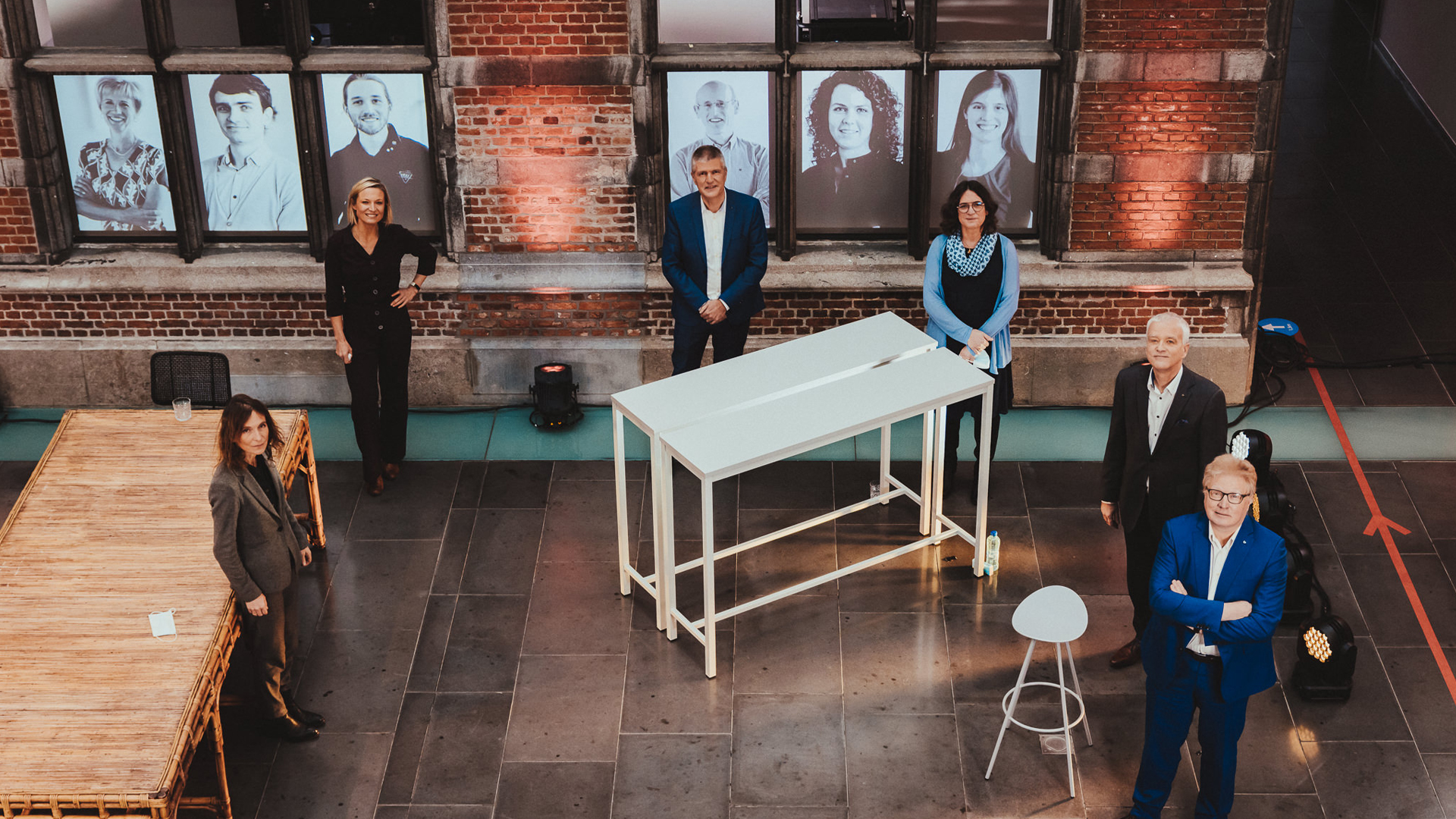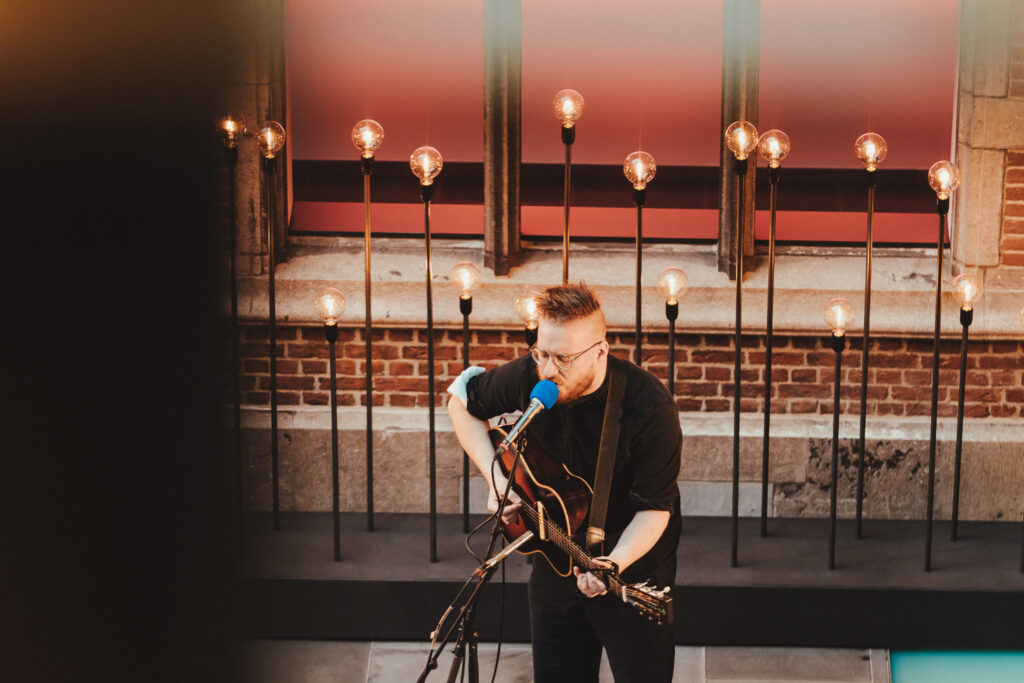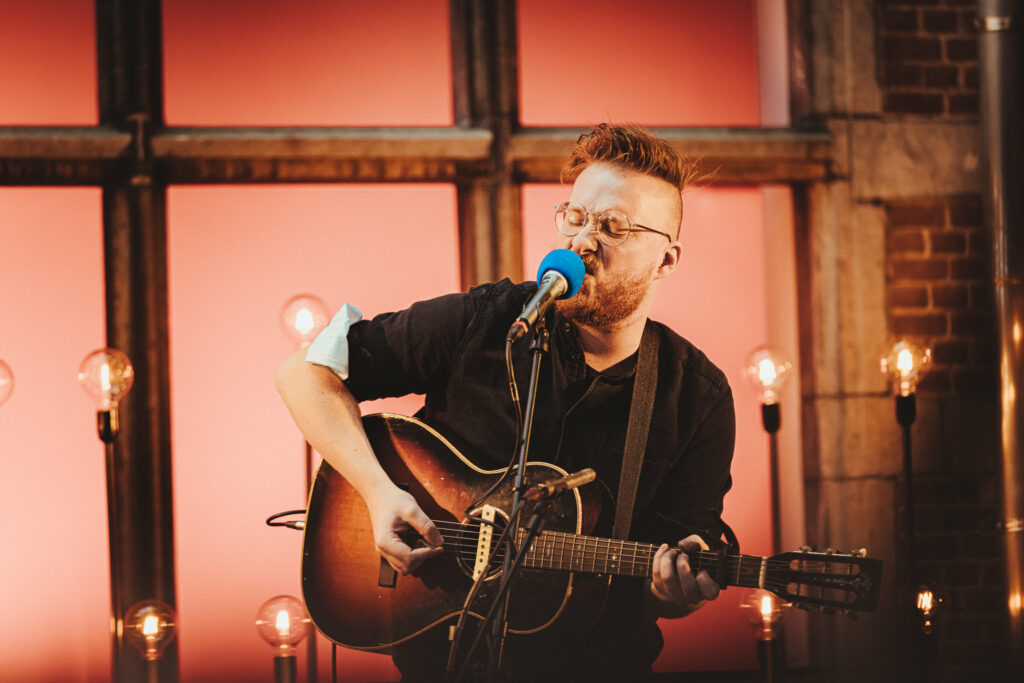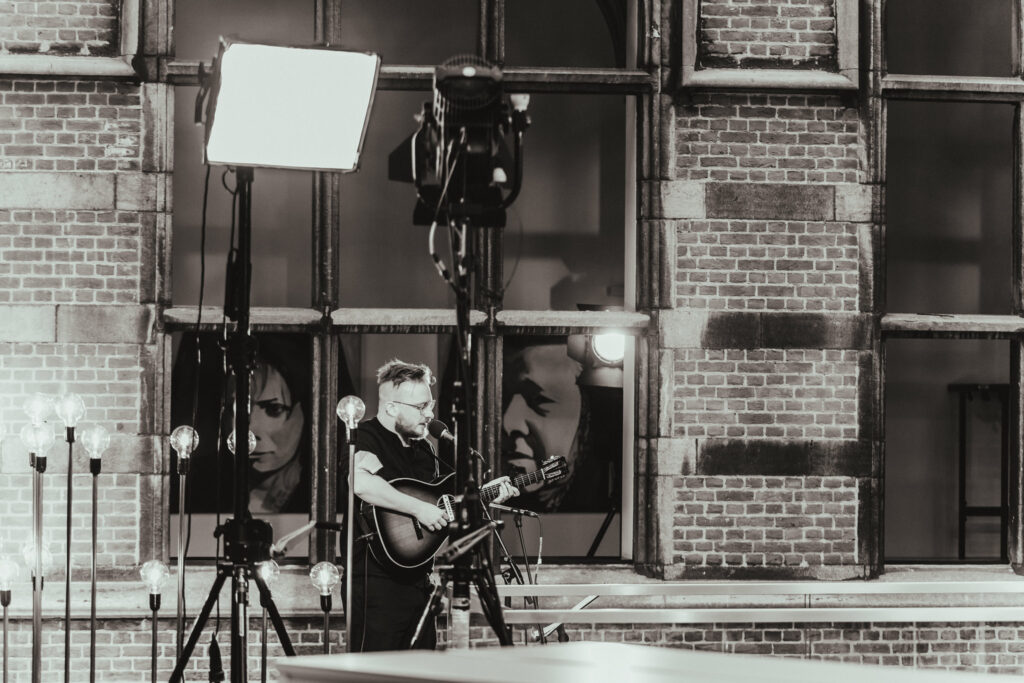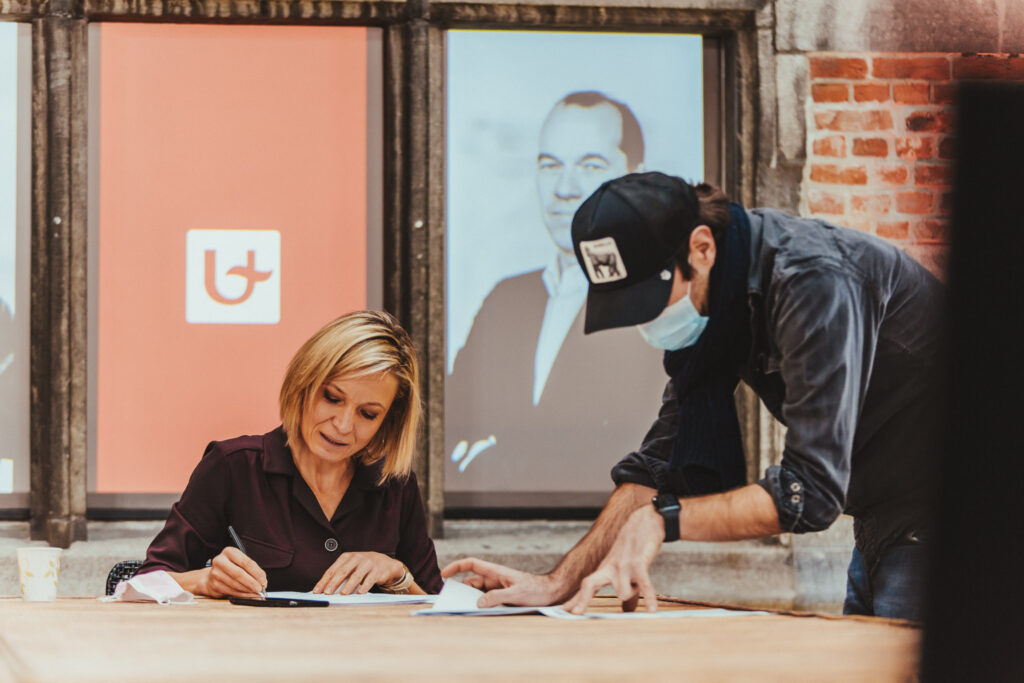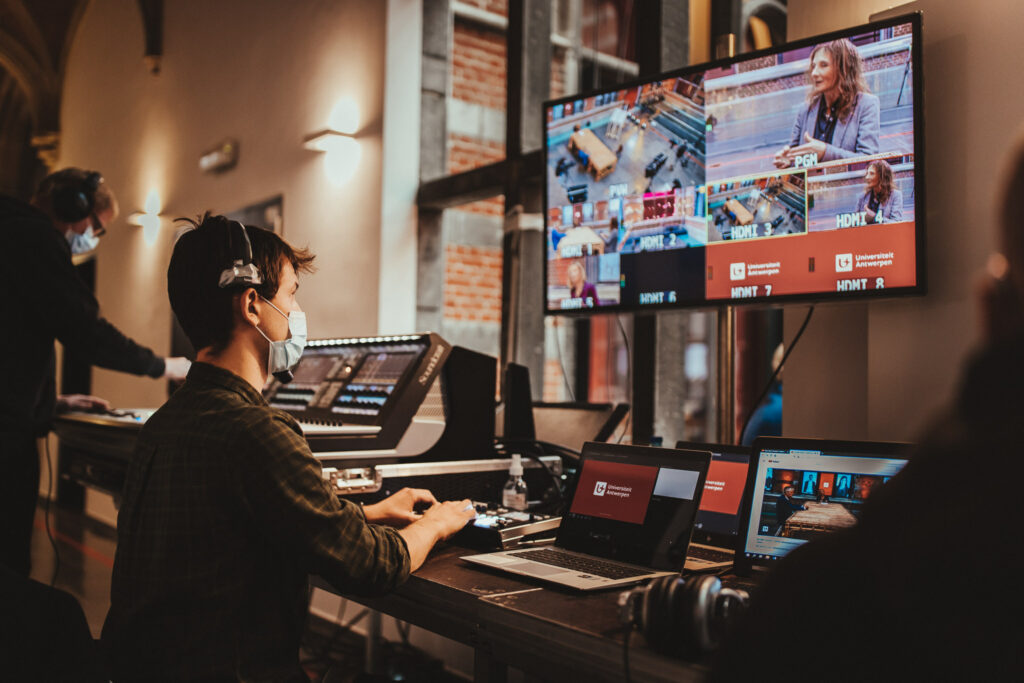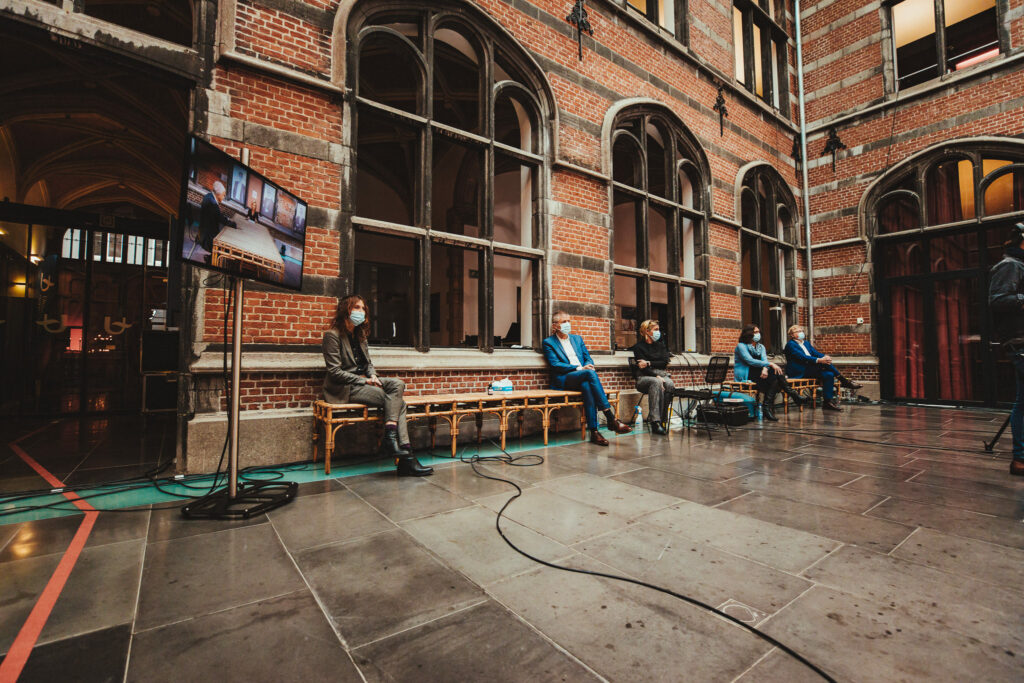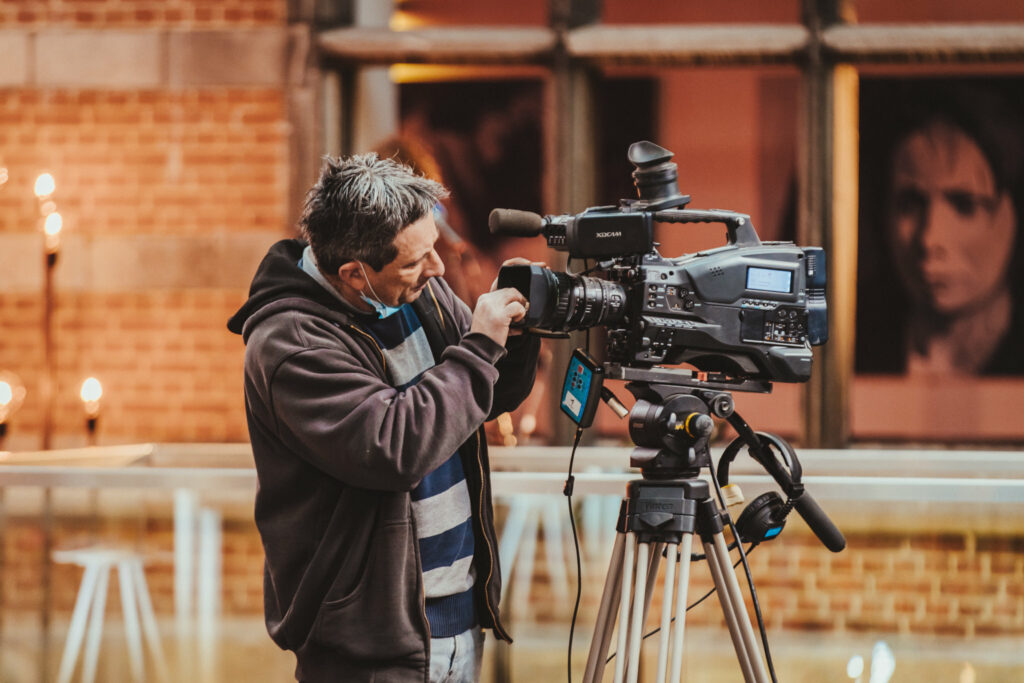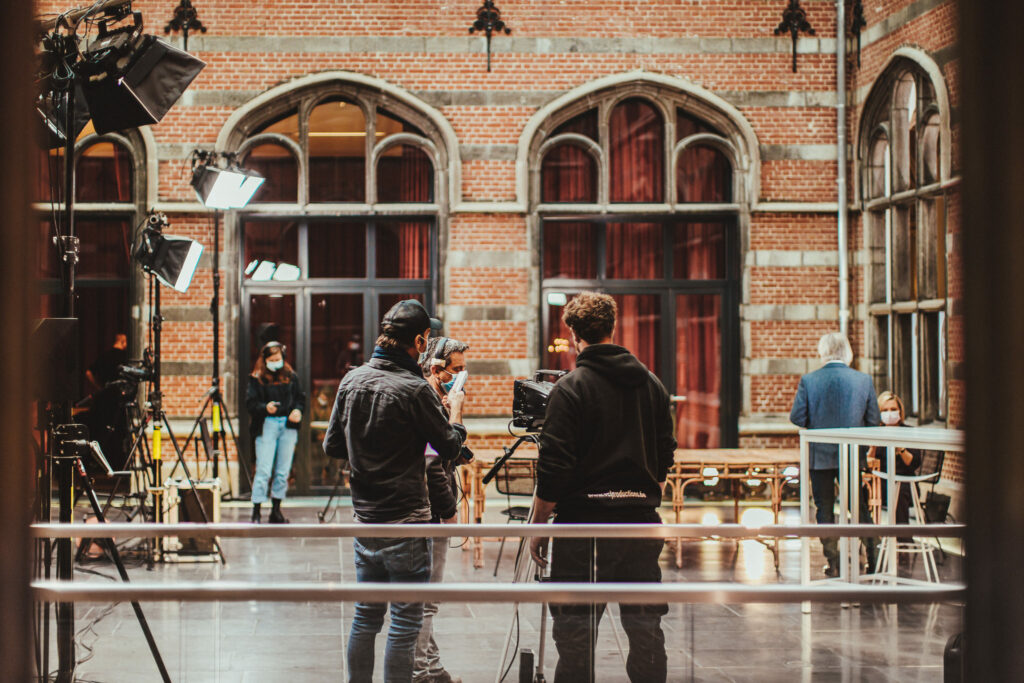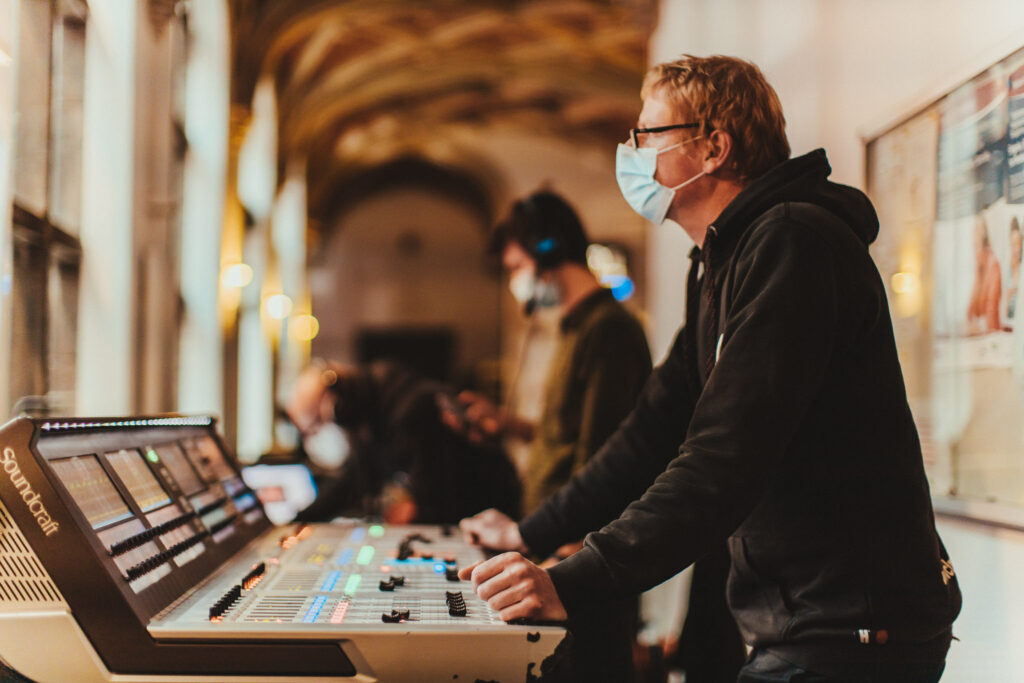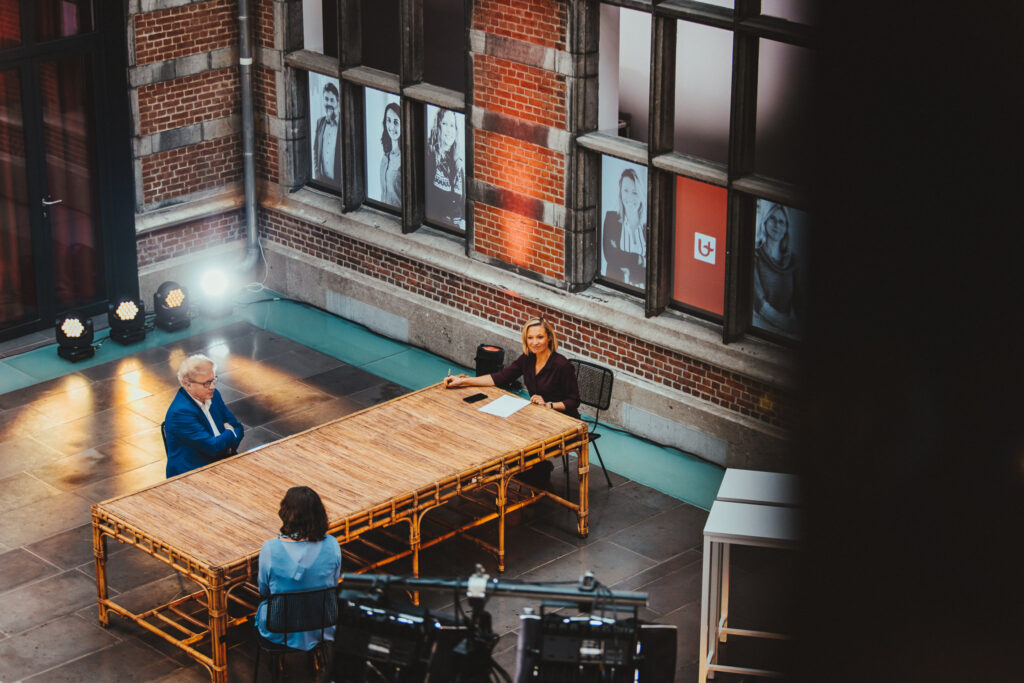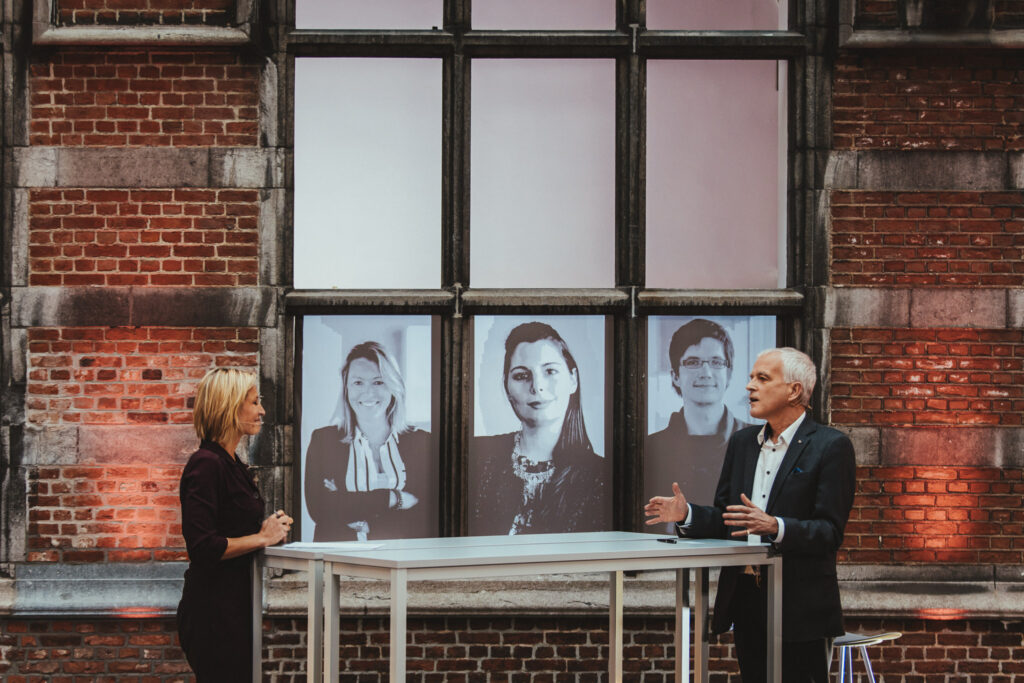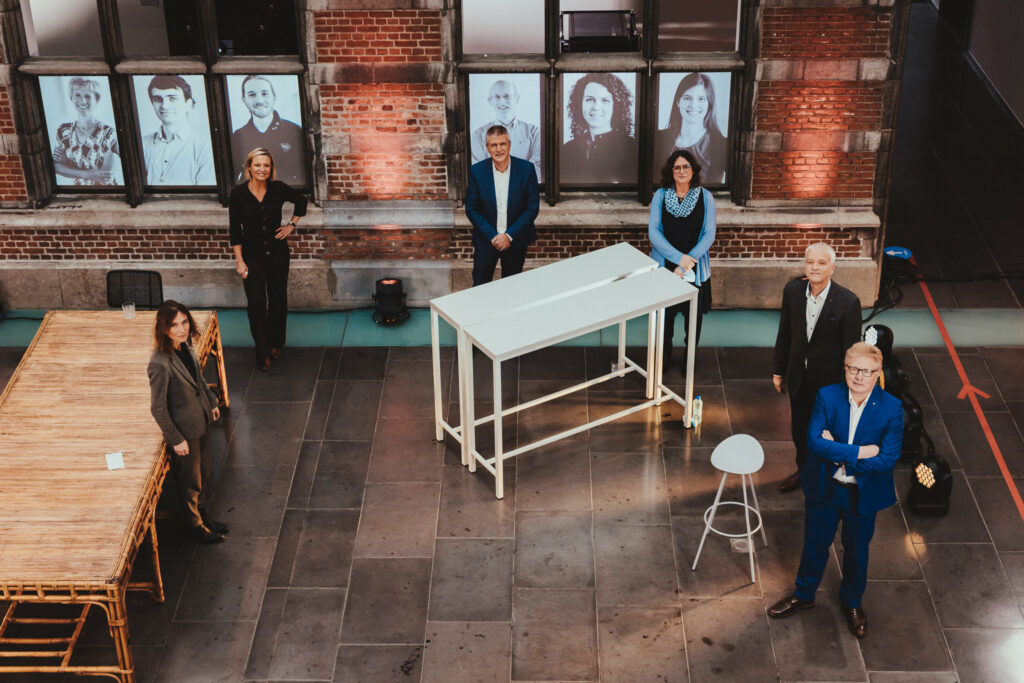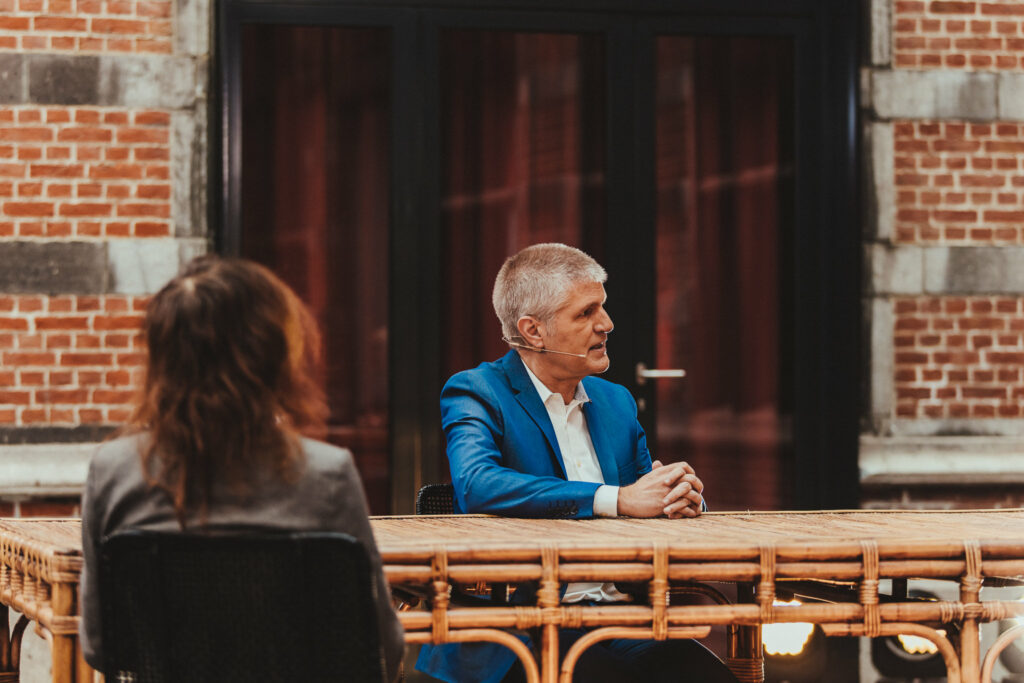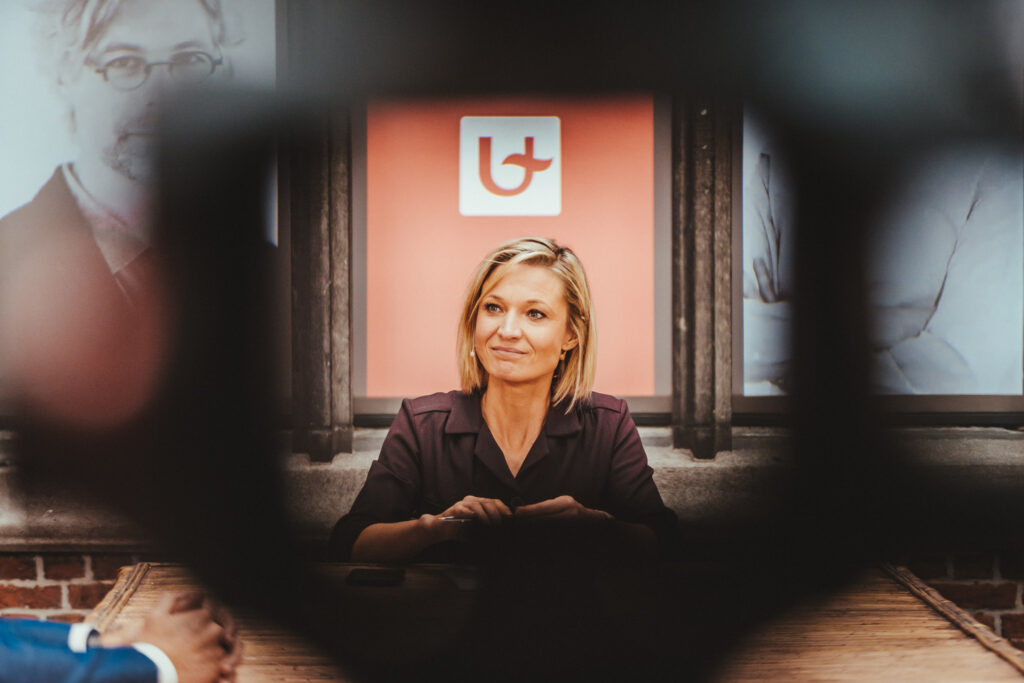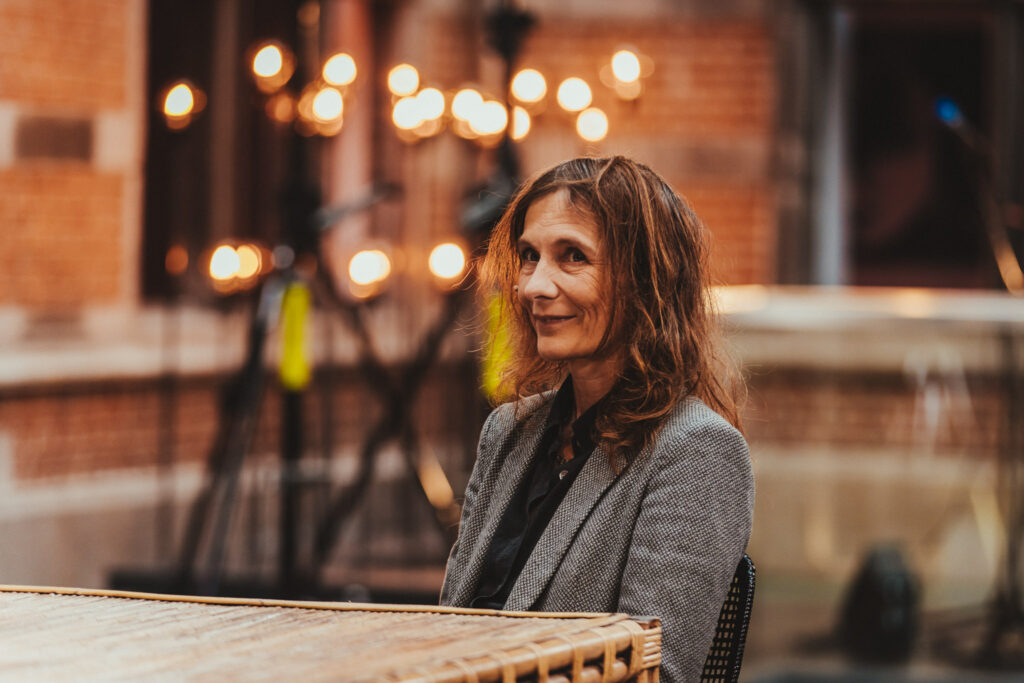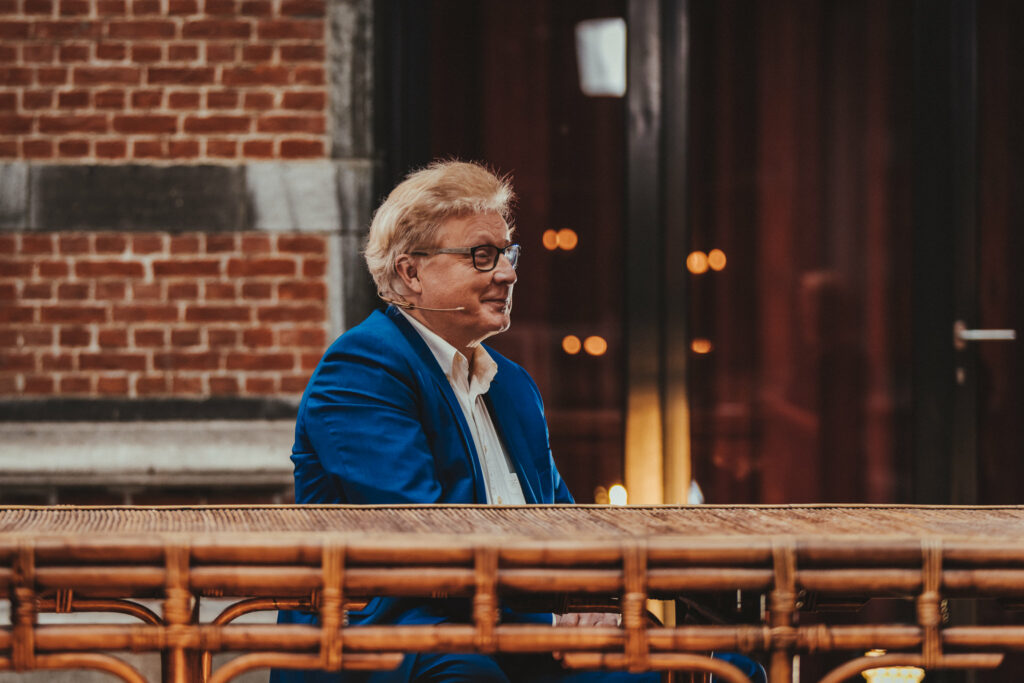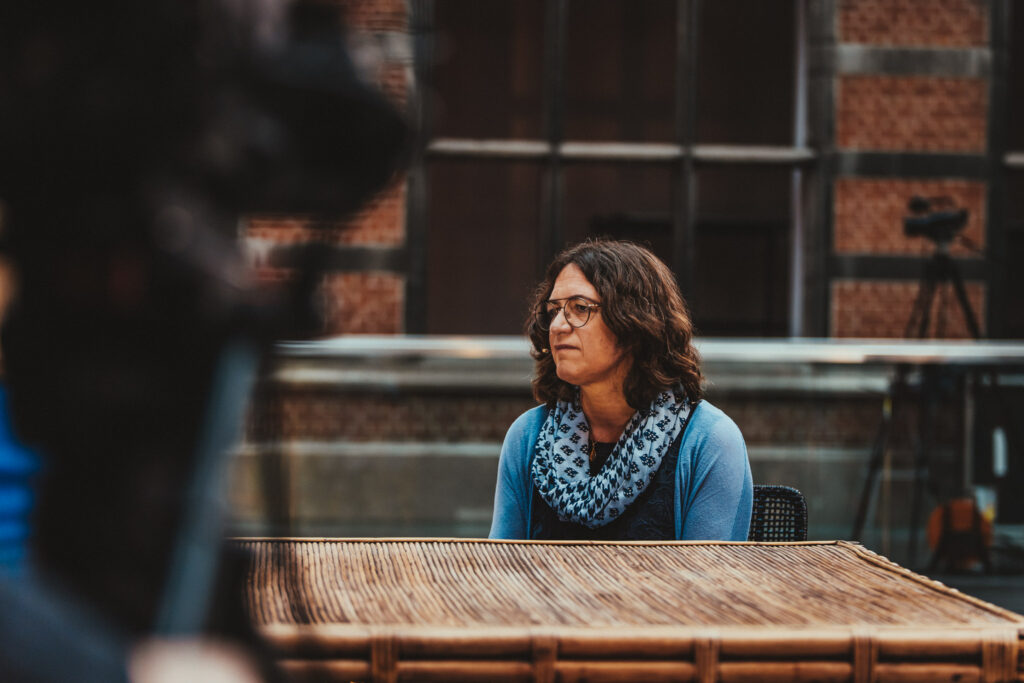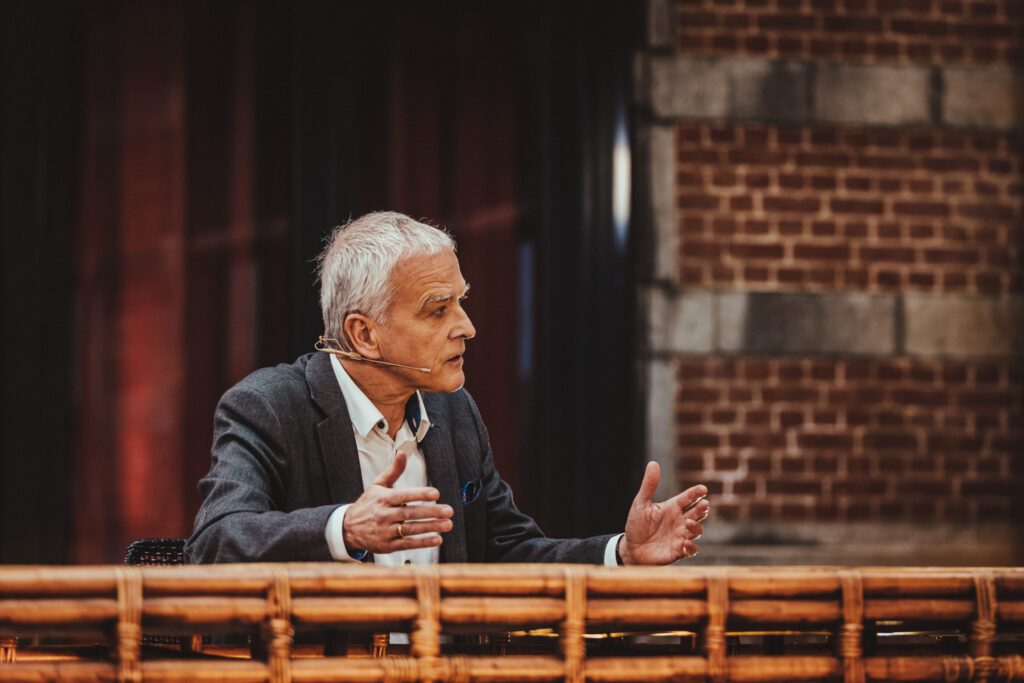All UAntwerp employees were invited to watch the online New Year’s debate ‘A Look Ahead’ on 8 January 2021. National TV news anchor Goedele Wachters, who hosted the event, compared this version of the annual New Year’s reception to the pub with no beer that the late Bobbejaan Schoepen and Slim Dusty sang about. ‘But that doesn’t mean we’re sad’, she said – ‘this pub will still be very cosy despite the lack of beer.’ The reception included conversations with Rector Herman Van Goethem and the vice-rectors, interspersed with heart-warming New Year’s wishes from our international staff and musical interludes provided by UAntwerp alum Johannes Genard, lead singer of the acclaimed band School is Cool.
Kicking off the debate, Goedele Wachters interviewed the rector, pointing out the stark contrast with last year’s New Year’s reception. Rector Van Goethem: ‘Last year there were seven hundred of us. Receptions like that really make you feel united, like one big team. We may not be able to convey quite the same feeling with this online version, but I’d still like to thank the entire staff for all their hard work, especially since March. And a lot of new things are on the horizon, including our new house style. The new main colour is red, a very intense colour. Because intense is what we’re aiming for. So we have a lot to look forward to.’
At the service of society
Then it was time for the vice-rectors to come to the moderator’s table and give some more information about what’s being planned for the coming months. First up were Filip Lardon (Vice-Rector for Services) and Silvia Lenaerts (Vice-Rector for Innovation and Valorisation). For every guest at the table, a short video had been prepared with an interview by TV and radio host Karolien Debecker. In the first video, Katleen Bracke (University of Flanders) expressed a bold opinion about scientists: ‘They should take a cue from populists, actually. They should explain in layman’s terms what’s going on in the world and how we can change it for the better. Today, scientific communication is already quite good. Scientists are putting more thought into it. As a result, our trust in scientists is increasing, and we’re paying more attention to what they’re telling us. So the focus is shifting from personal opinions to well-founded knowledge.’
Vice-Rector Lardon expounded on this: ‘Universities have to play their part in this situation. At the University of Antwerp, we have a lot of research that can help move the world forward. It’s up to our researchers to share and explain the results of that research. We’re already offering workshops on the best way to go about that, keeping things simple yet factually correct. After all, we are at the service of society. But society also helps us. Companies provide us with financial support, but also with their specific know-how and other services. Our University Fund is a great example of this. Thanks to the contributions of both companies and private individuals, we can conduct a lot of research.’
Promoting internal and external cooperation
For Vice-Rector Silvia Lenaerts’s video, Karolien Debecker spoke with climate coordinator Mariam Al-Bouawad. ‘The University of Antwerp launched an ambitious climate plan. Working together with various working groups meant that we managed to get a lot more done than we would have on our own. So we should cooperate like this much more often. After all, as a university, we should always be one step ahead of society’, says Al-Bouawad.
Vice-Rector Lenaerts echoed this sentiment: ‘A university like ours can be a leader when it comes to sustainability. We have the right people, extensive knowledge and reliable technologies to make that happen. With our Sustainable Development Goals, I think we’ve set challenges and objectives that every employee can get behind. As my colleague Mariam rightly points out, we can find answers to complex issues like sustainability by working together.’
2020 brought us a pandemic and all the negativity that comes with it, but there were some silver linings as well. Vice-Rector Lardon: ‘This crisis has affected society, which has actually led to more donations to the University Fund. This has allowed us to pursue vaccine research, for instance. Thanks to all the extra financial support, we were also able to get several spin-offs to market much faster. And there’s more knowledge in the pipeline, ready to serve people and society.’
Herman Van Goethem reacted to these statements by stressing the need for more and stronger cooperation. ‘Our university needs to think globally and promote both external and internal cooperation. What I’m hearing is a message of enthusiasm. It’s a privilege to be in the front row for this.’
Study progress guidance instead of monitoring
Next, Goedele Wachters welcomed Ronny Blust (Vice-Rector for Research) and Ann De Schepper (Vice-Rector for Education). Karolien Debecker had done her homework for them as well. In the video interviews she spoke with Lieselot Declercq, a working student at UAntwerp and founder of d-teach, specialised in online education. ‘Being able to take classes online is very important, especially for working students’, says Lieselot. ‘I also believe that the future is blended, with a mix of face-to-face and online education.’
Vice-Rector Ann De Schepper agreed wholeheartedly: ‘Naturally, e-learning has gained momentum over the past year. But so far, it’s been more of an end than a means. It’s up to us to emphasise that it should be a means to an end, and to make it more powerful.’ De Schepper also wants to focus more on student support: ‘This support could take various forms, such as reorienting students, giving recognition to those who excel, providing extra support or setting extra challenges, and so on. We want more study progress guidance, and less study progress monitoring.’
More trans- and interdisciplinary consultation
For Vice-Rector Ronny Blust, moderator Goedele Wachters had an interview ready with Hugo Waeterschoot, an independent advisor and active member of Natuurpunt. He made a plea for interdisciplinary consultation: ‘As a researcher, you need to build bridges to disciplines other than your own, and preferably as early as possible in your journey.’ Vice-Rector Blust: ‘The challenges of our society are so complex that the only way to solve them is through trans- and interdisciplinary consultation. It helps people understand each other, cooperate more efficiently, and come up with solutions faster. This way, major errors can be avoided. The time you invest in it now will definitely pay off later. Transdisciplinary work is really taking off now, and the university is the perfect place for it.’
The Vice-Rectors for Research and Education also saw some silver linings to this pandemic. ‘Thanks to blended learning, we now know that some work can be done anywhere, which also makes interdisciplinary work easier’, said Ann De Schepper. Ronny Blust agreed: ‘Bringing people and things together is now a lot easier.’
Rector Van Goethem also saw the importance of cooperation across disciplines. ‘We always want to be one step ahead in this ever-changing world. We also have to be critical of ourselves and dare to think differently. In terms of funding, it’s important to consider where we’ll be, say, ten years from now. We have to turn disadvantages to our advantage and strengthen our long-term vision. Everything I’m hearing today I’ll be taking into account when writing our policy plan. This was delayed by the pandemic, but it will certainly be on the agenda in the coming months. I’m very proud of UAntwerp. We’re a strong university.’
Cooperation within Europe, within Flanders, and within our university
A video had also been prepared for the rector, featuring Snježana Prijč-Samaržija, rector of the University of Rijeka in Croatia. She explained the importance of YUFE (Young Universities for the Future of Europe): ‘As a university, we must participate and contribute to the larger European idea. We’re being given the opportunity to help bridge the gap between different European countries.’
Prof. Van Goethem recognised the importance of Europe for the university: ‘The European model is a permanent model. But cooperation is needed on other levels as well. Within Flanders, there are significant strides to be made. And certainly internally, we need to foster cooperation across faculties. Only after becoming rector did I come to realise that this university truly is a tight-knit community. Before, as a researcher, I was actually a bit of a loner, and I liked hanging out in archives… can you imagine? I’m counting on our entire community for the policy plan: let’s write our future together. Feel free to join the discussion on the Pintra blog.‘
The event was brought to a close with the music of Johannes Genard. School is Cool’s latest album, released just before the first lockdown, was aptly named Things That Don’t Go Right. But the songs that Genard performed were just right, helping to soothe the pain that 2020 inflicted on all of us. We’ll take the comforting, touching and hopeful messages in his songs into 2021. Or as Genard put it: ‘Let’s hope that 2021 needs fewer plasters.’
You can watch the full live stream of ‘A Look Ahead’ with live simultaneous interpreting in English.


